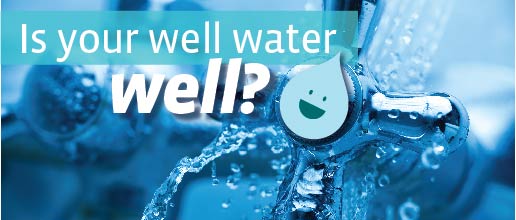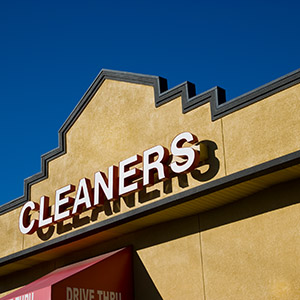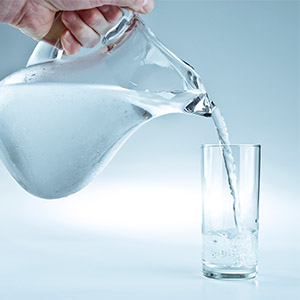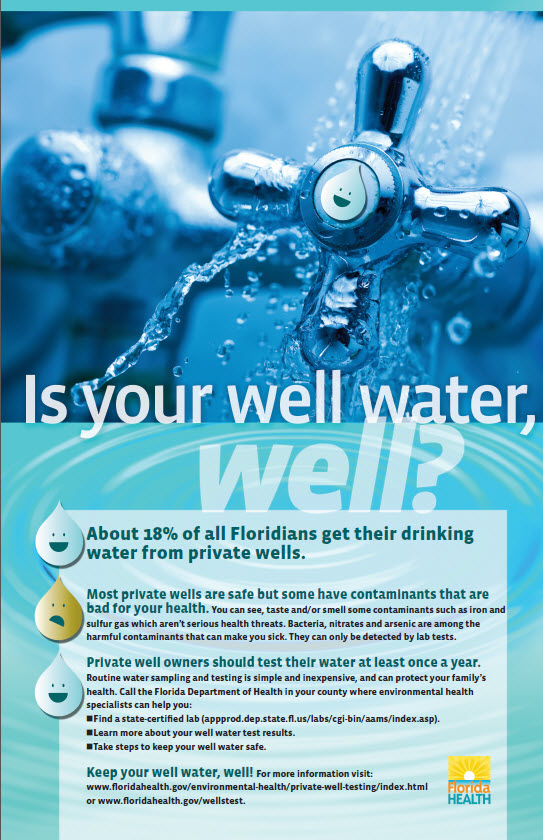It's a New Day in Public Health.
The Florida Department of Health works to protect, promote, and improve the health of all people in Florida through integrated state, county, and community efforts.
Private Well Testing
Contact Water Programs
- 850-245-4250
- AskEH@flhealth.gov
-
Fax
850-487-0864

Welcome to the Florida Department of Health's Private Well Testing web site. Detailed information is found within the topics listed below.
To view how to send specimen to BPHL for testing, please visit DOH BPHL Environmental Laboratories
force line break in cascade
force line break in cascade
- About Groundwater
- Private Well Owner's Guide
- Potential Contaminants
- How and When to Test
- Well Equipment Maintenance
- Tenants, Landlords and Business Owners
- Children
- Resources
- Frequently Asked Questions
 Because we live in Florida, we are lucky to have a plentiful source of ground water. Ground water fills the cracks and pores in sand, soil, and rocks that lie beneath the surface of the earth, much like water saturates a sponge. These saturated layers of earth are called aquifers, and they are the primary source of drinking water in Florida.
Because we live in Florida, we are lucky to have a plentiful source of ground water. Ground water fills the cracks and pores in sand, soil, and rocks that lie beneath the surface of the earth, much like water saturates a sponge. These saturated layers of earth are called aquifers, and they are the primary source of drinking water in Florida.
Due to its protected location underground, most ground water is naturally clean and free of contaminants. Unfortunately, Florida's aquifers can become contaminated by chemicals and microbes that can cause illness. Bacteria and nitrate can reach the ground water and wells through poorly maintained septic systems, livestock areas and fertilizer application, or as a result of poorly constructed wells. Chemicals can enter into the ground water from leaking gasoline storage tanks, pesticide applications, landfills, and improper disposal of toxic and hazardous wastes. As a private well owner, you should be aware of these potential risks to the ground water and your household water supply.
Do you have a well?
About 88% of Florida's residents are served by public water systems covered by the Federal and State Safe Drinking Water Acts. The other 12% receive their water from "limited-use" public water systems and private wells. While all public water systems in Florida are required to perform routine testing to ensure that they meet state drinking water standards, private well owners are responsible for ensuring that their OWN well water is safe to drink.
The Federal Centers for Disease Control and Prevention (CDC) have reported that consumption of contaminated drinking water in the United States has resulted in thousands of cases of illness each year. Contaminated drinking water can cause a number of diseases, and is sometimes fatal. The most common contaminants are microbes and nitrate.
Microbes: Many types of bacteria themselves are generally not harmful, but their presence is an indication that other harmful bacteria, viruses, or parasites may also be present. Diarrhea, nausea, and vomiting are some of the most common symptoms resulting from drinking water that is contaminated with harmful bacteria.
Nitrate: High levels of  nitrate in drinking water can pose an immediate threat to infant children. When consumed, nitrate is known to react with hemoglobin in the blood causing an anemic condition known as the "blue baby syndrome."
nitrate in drinking water can pose an immediate threat to infant children. When consumed, nitrate is known to react with hemoglobin in the blood causing an anemic condition known as the "blue baby syndrome."
To ensure that your private water supply is safe and healthy, you should understand the importance of maintaining your own well and water system and performing routine water quality tests.
The following links are all pdfs <2mb, opens in new window:
Homeowner's Guides to Your Well
The following links are all pdfs <1mb, open in new window:
Chemical Contaminants - HALs and Chemical Fact Sheets
Coliform Bacteria Fact Sheet
 Test Your Well Water Every Year - It's Simple and Inexpensive
Test Your Well Water Every Year - It's Simple and Inexpensive
If you have a private well, the Department of Health strongly recommends that you test your water for bacteria and nitrate at least once per year. Routine water testing is a simple and inexpensive measure you can take to ensure that your water supply is safe and to protect your family's health. Your local county health department can provide you with instructions on how to collect the water samples yourself and to have them tested (usually $20-30 per sample). In some cases, local health department staff can come to your home and collect the samples for you, if you wish, for an additional fee (additional $30-$40 per visit). Private state-certified laboratories are also available to perform water testing and can be located in the phone book, by searching DEP's online laboratory listing, or by asking your local health department for a listing.
While bacteria and nitrate are the most common threats to your drinking water, your water well may also be susceptible to other contaminants. Depending on past and present land-use activities or other sources of contamination in your neighborhood, additional water tests may be recommended by your local health department. In some cases, the health department may be able to do testing for certain toxic substances free of charge. In some counties, testing for naturally occurring radiological contaminants may also be recommended. Be sure to ask your local health department if they recommend that you have your water tested for any other contaminants besides bacteria and nitrate.
Be sure to always use a state-certified laboratory to ensure that the results are valid. Your local county health department can help you understand your test results and advise you on measures you should take should the results show that your well water is contaminated. You may need to disinfect your well, repair your water system, or install treatment equipment. Again, be sure to use a state-certified laboratory to test your water to protect yourself from water treatment equipment sales companies that may try to sell you unnecessary treatment equipment.

What Should I do If My Well is Flooded? (pdf<1mb, opens in new window)
Testing Your Drinking Water for Safety (pdf<1mb, opens in new window)
 Floridians should be aware that in Florida, if a well provides water to 2 or more rental residences, or if a well provides water to a home that is used as a day care facility, group home, nursing home or assisted living facility, then the well is actually considered a Public Water System, NOT a private well. Also, if a water well serves a business or commercial establishment, it is considered a Public Water System.
Floridians should be aware that in Florida, if a well provides water to 2 or more rental residences, or if a well provides water to a home that is used as a day care facility, group home, nursing home or assisted living facility, then the well is actually considered a Public Water System, NOT a private well. Also, if a water well serves a business or commercial establishment, it is considered a Public Water System.
Public Water Systems are regulated by either the Florida Department of Environmental Protection (FDEP) under the Safe Drinking Water Act, or the Florida Department of Health (FDOH) under 381.0062 of the Florida Statutes and Chapter 64E-8 of the Florida Administrative Code. Typically, if a water system serves less than 25 people and less than 15 service connections, then it is regulated by the FDOH as a smaller Limited Use Public Water System and if it serves more than 25 people or more than 15 service connections, then it is regulated by the FDEP as a larger Community or Non-Community Water System.
In either case, the owner of a Public WaterSystem is required to conduct routine water quality testing and to properly maintain and operate the system according to Florida rules. These requirements help to protect residents, employees, and consumers from possible water contamination, and to prevent waterborne diseases. For questions or concerns about a public water system, please contact the Environmental Health Division at your Local County Health Department.
Public WaterSystem is required to conduct routine water quality testing and to properly maintain and operate the system according to Florida rules. These requirements help to protect residents, employees, and consumers from possible water contamination, and to prevent waterborne diseases. For questions or concerns about a public water system, please contact the Environmental Health Division at your Local County Health Department.
More Information for Businesses, Tenants, Realtors and Landlords:
Buying or Selling Homes with Wells Information Sheet (pdf<1mb, opens in new window)
Buying a Home with a Well (opens in new window)

Drinking Water and Ground Water Kids' Stuff (opens in new window): Educational games and activities are offered for students and teachers.

Ground water and drinking water resources (opens in new window) are provided by the U.S. Environmental Protection Agency.
Know the basics of water well systems (opens in new window) (from the National Ground Water Association).
Educational and governmental web sites provide additional information (opens in new window) for water well owners and consumers.
I'm buying/selling a house with a well. What testing does the state require?
The state of Florida does not have a requirement for well sampling when private homes are sold. However, our general recommendations are that private water wells be tested for coliform bacteria (pdf<1mb, opens in new window), nitrates (pdf<1mb, opens in new window), and lead (pdf<1mb, opens in new window). Any certified drinking water lab should be able to handle these tests for a reasonable price. Other tests may be useful, depending upon the location, depth, and condition of your well.
I live in a house served by a well. What tests do I have to run?
The state of Florida does not have requirements for routine private home well water sampling. However, we recommend that homeowners test their water for coliform bacteria and nitrates every year. Also, most homeowners should test for lead every three years.
Some of our County Health Departments are responsible for enforcing local rules requiring testing of newly-constructed wells or repairs. If you live in Brevard, Broward, Citrus, Duval, Flagler, Highlands, Hillsborough, Osceola, Palm Beach, Pinellas, Sarasota, or Volusia County, you should contact your local DOH office.
Where can I find a list of certified laboratories that can do water testing?
The Department of Environmental Protection maintains a database of certified laboratories. (opens in new window)
Please be aware that not every lab on the list will suit your needs. You may need to call several in order to find the right one for you. You should also contact your local County Health Department, as they are the local experts and may have additional information or contacts.
I rent a house served by a well. What does my landlord have to do?
There are no specific testing requirements for a well serving a single-family home or a structure containing a single rental unit. Wells serving multiple rental units or commercial property may fall under the Limited Use Public Water System rule or Florida's Safe Drinking Water Act.
Note that under Florida's Landlord/Tenant Law (opens in new window), the landlord is responsible for maintaining plumbing in reasonable working condition. Questions or complaints should be directed to the Florida Department of Agriculture and Consumer Services Division of Consumer Services.(opens in new window)




Connect with DOH